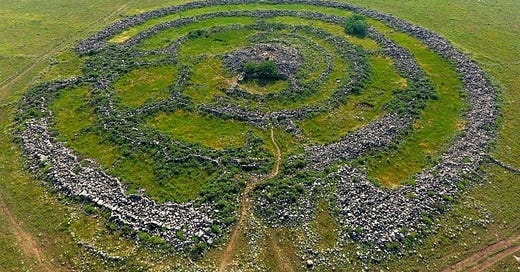This is the second part of an essay series which takes as its inspiration something Wendell Berry said in The Unsettling of America: “Over and over again, spring after spring, the questing mind, idealist and visionary, must pass through the planting to become nurturer of the real.” Resounding in the background, too, as if across an empty canyon where our hearts used to be, is Vine Deloria's rhetorical question to the sunset of the West: “Can the white man's religion make one final effort to be real?” The first essay in the series was All Over the World the Faces of Living Ones Are Alike, which is now free for anyone to read.
They led me to the center of the circle where once more I saw the holy tree all full of leaves and blooming...Against the tree there was a man standing with arms held wide in front of him...His hair was long and hanging loose...His body began to change and became very beautiful with all colors of light, and around him there was light. He spoke like singing: “My life is such that all earthly beings and growing things belong to me. Your father, the Great Spirit, has said this...”
– Black Elk, Black Elk Speaks
Five or six years ago I read a gospel I hadn't read before, and instantly and effortlessly loved every word of it, and have ever since.
Its first translator into English called it The Secret Sayings of Ye Su: A Silk Road Gospel, because, if authentic, its origin is probably in Tang dynasty China, twelve or thirteen centuries ago, a time and place in which Christianity was known simply as the “Luminous Religion of the West.”
This ancient form of Christianity—the luminous religion of the Galilean dharma-kings—was once a strong flower blooming from its own time and place, but is now extinct, and something beautiful has been lost:
Ye Su asked Mary, “What shall you do when I return from the dead?”
Mary said, “If you were to return from the dead, I would observe awe-struck silence and speak to no one about it.”
Ye Su said, “You have learned well, Mary.”
Peter said, “But we must say something. How can we proclaim the good news if we say nothing?”
Ye Su smiled but did not speak. Then he led his disciples in the Great Circular Dance of Joy that they danced until the dawn.
Isn't that lovely? Isn't that luminous?
But also—so far away?
We live in times when we can feel quite acutely the pain of some kind of inconceivable rupture: a rupture with the past, a rupture with the Earth. A rupture from God, in whom “we live and move and have our being”—or at least we used to (we still do, but we used to feel it, too).
For many, the answer is to hang for dear life onto sacred tradition.
And for me, too, reaching out for the strands of some sacred culture in the vast and windy, blue sky, dizzying emptiness of the rupture—finding what's good and beautiful, never letting go: What else is there?
Tradition is deep memory, almost the deepest kind. A kind of dreamlike collective body-memory of the tribal circle, rippling beyond the horizon of only one human skin-bag and its handful of sand in the hourglass, and in a basically literal sense, we can't live without it—or we can, but only as little more than forlorn human machines, empty human shells.
As the madness of our times attests.
But sacred tradition, like anything else that's really real, not an ideological construct—anything as real as stones and flowers, as mountain ranges and the sun—is impermanent and ephemeral, eroded by the winds of time:
All flesh is grass,
and all its loveliness is like the flower of the field
The grass withers, the flower fades
For the breath of Adonai blows on it
Surely the people are grass
The grass withers, the flower fades
But the word of our God stands forever
(Is. 40:6-8)
—this “word” being not some time-exempt sacred text, but the presence of the One himself as a grass-renewing, flower-renewing, mind-renewing breath:
For as the rain and snow
come down from the sky,
and do not return there
without having watered the Earth,
making it bring forth and sprout
...so my word will be that goes out from my mouth
(Is. 55:10-11)
A spoken word. A living word, like vocal wind—a word which won't be controlled by the likes of us.
Here comes the paywall, placing my hat on the sidewalk of the world as a writer. Past the wall, you'll find the rest of the essay, an easily printable PDF version of it, a recording of me reading the essay in soundscape that fits the mood—a seashore maybe, or bustling city, or a sunlit forest—and the comment section, where you're safe to say what you really think.
-graham






